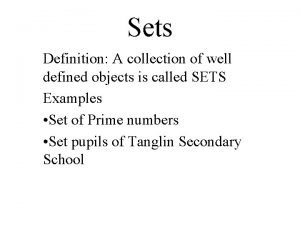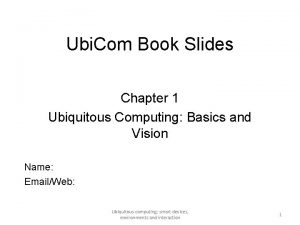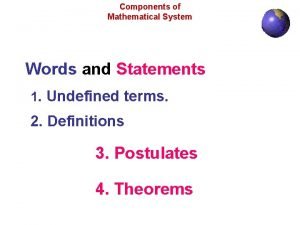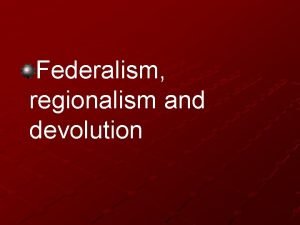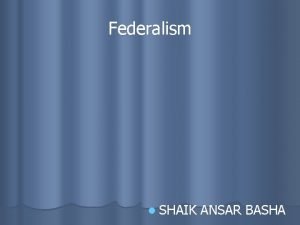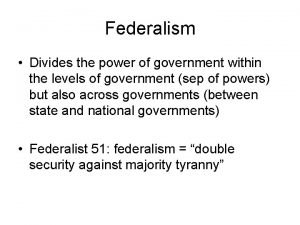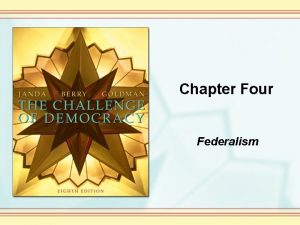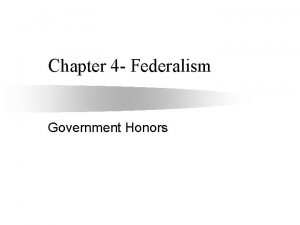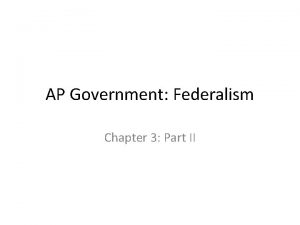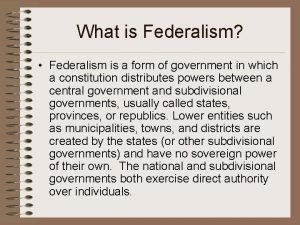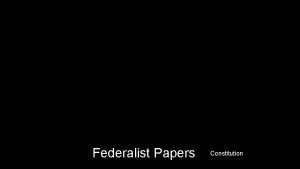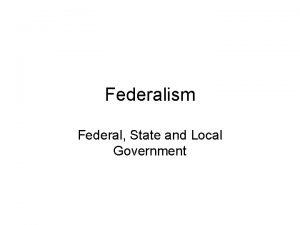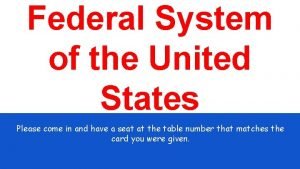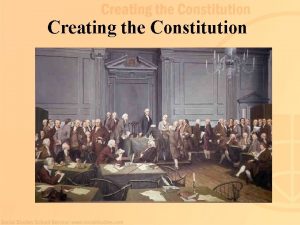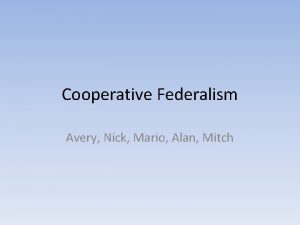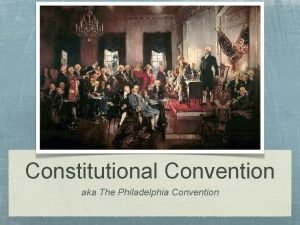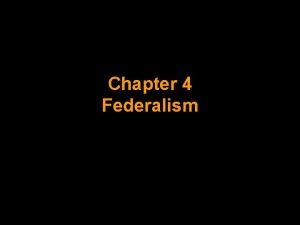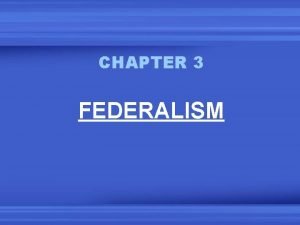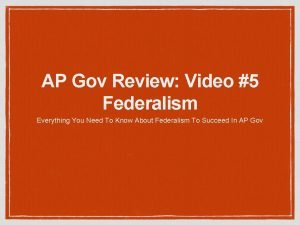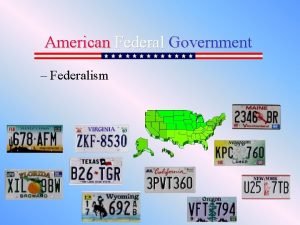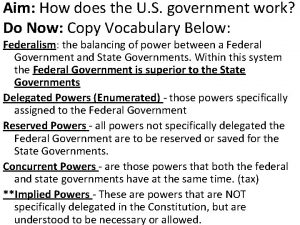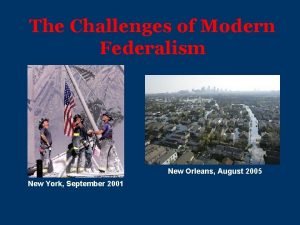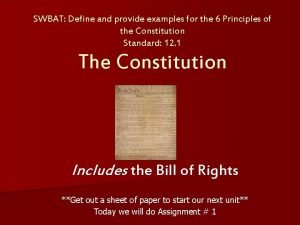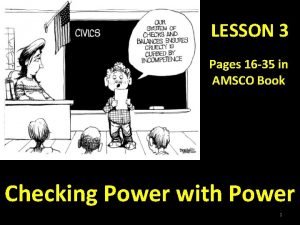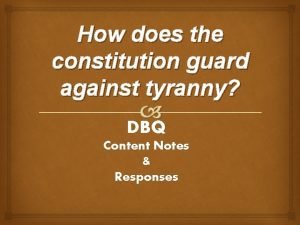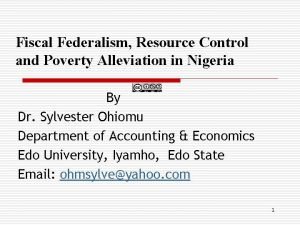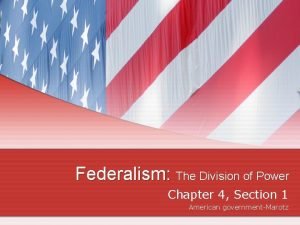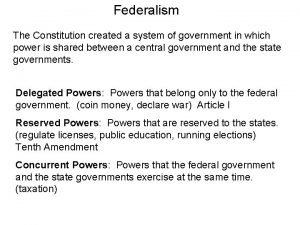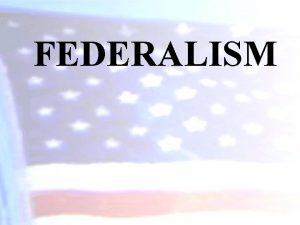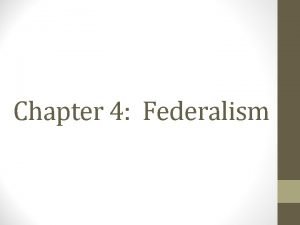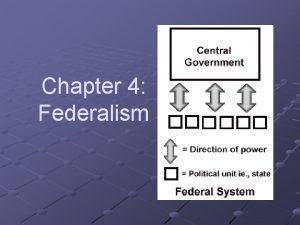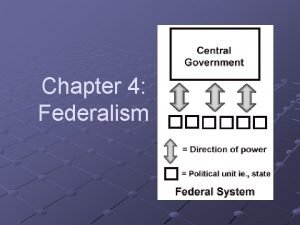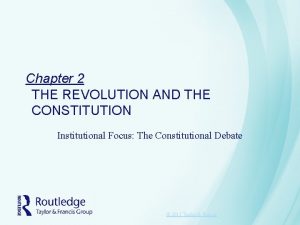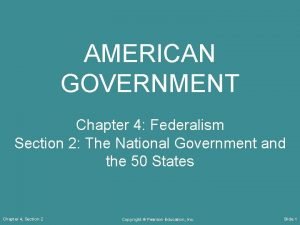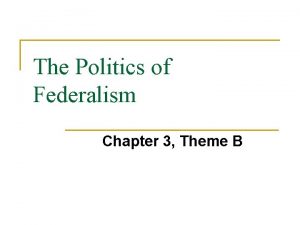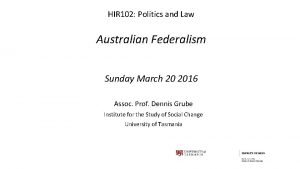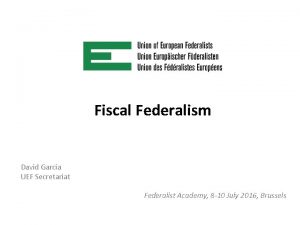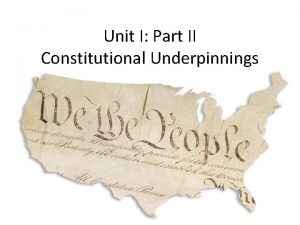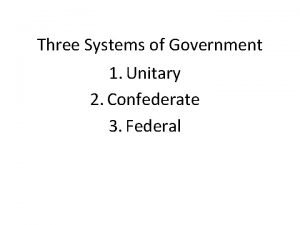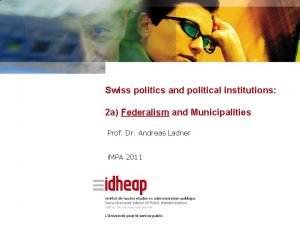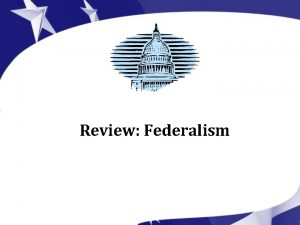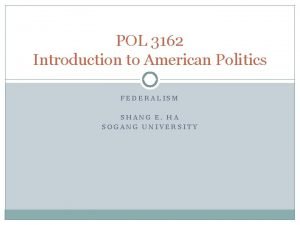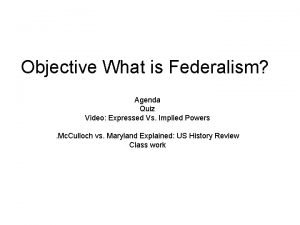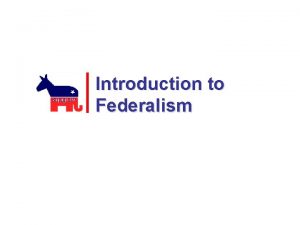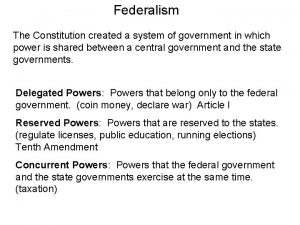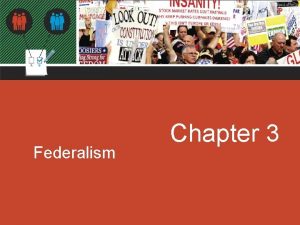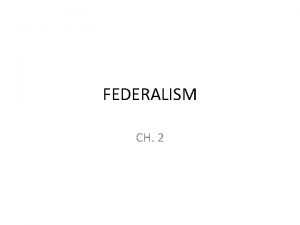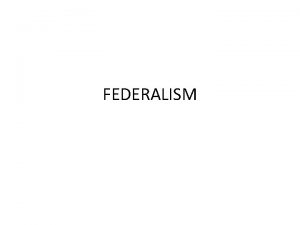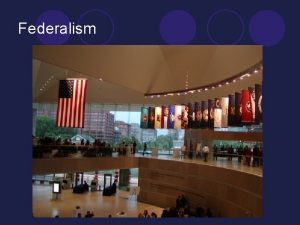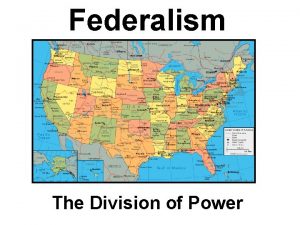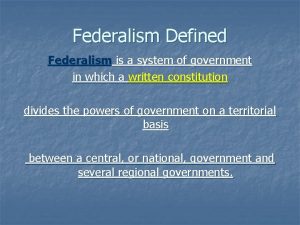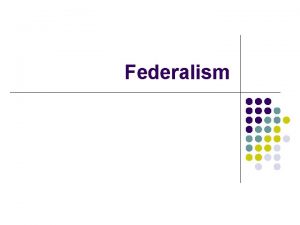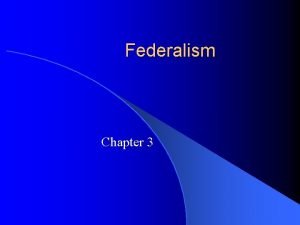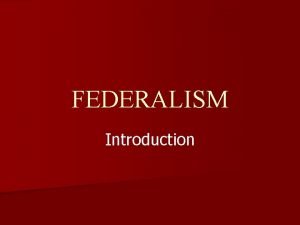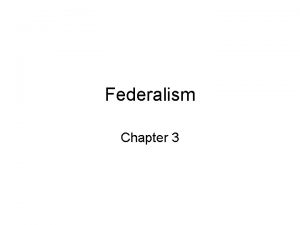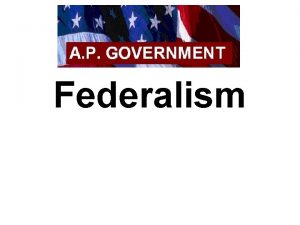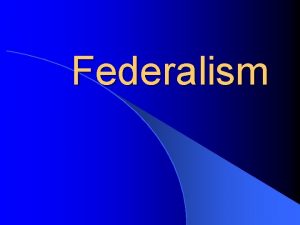Federalism Federalism Defined Federalism is a system of























































- Slides: 55

Federalism

Federalism Defined Federalism is a system of government in which a written constitution divides the powers of government on a territorial basis between a central, or national, government and several regional governments, usually called states or provinces. The Constitution provides for a division of powers, assigning certain powers to the National Government and certain powers to the States.

Why Federalism? The Framers were dedicated to the concept of limited government. They were convinced (1) that governmental power poses a threat to individual liberty, (2) that therefore the exercise of governmental power must be restrained, and (3) that to divide governmental power, as federalism does, is to curb it and so prevent its abuse.

Strengths ■ Local matters can be decided locally. ■ Gives enough power to the national government to be effective in international and domestic affairs.

Weaknesses ■ Lacks uniformity. ■ Ongoing controversies over powers.

Powers of the National Government The National Government is a government of delegated powers, meaning that it only has those powers granted to it in the Constitution. There are three types of delegated powers: • The expressed powers are those found directly within the Constitution (also known as enumerated powers). Spelled out, expressly, in the Constitution • The implied powers are not expressly stated in the Constitution, but are reasonably suggested, or implied by, the expressed powers. • The inherent powers belong to the National Government because it is the government of a sovereign state within the world community. There are few inherent powers, with an example being the National Government’s ability to regulate immigration.

Powers Denied to the National Government Powers are denied to the National Government in three distinct ways: • Some powers, such as the power to levy duties on exports or prohibit the freedom of religion, speech, press, or assembly, are expressly denied to the National Government in the Constitution. • Also, some powers are denied to the National Government because the Constitution is silent on the issue. • Finally, some powers are denied to the National Government because the federal system does not intend the National Government to carry out those functions.

The States Powers Reserved to the States • The 10 th Amendment declares that the States are governments of reserved powers. • The reserved powers are those powers that the Constitution does not grant to the National Government and does not, at the same time, deny to the States. Powers Denied to the States • Just as the Constitution denies many powers the National Government, it also denies many powers to the States. • Powers denied to the States are denied in much the same way that powers are denied to the National Government; both expressly and inherently.

The Exclusive and Concurrent Powers Exclusive Powers Concurrent Powers • Powers that can be exercised by the National Government alone are known as the exclusive powers. • The concurrent powers are those powers that both the National Government and the States possess and exercise. • Examples of the exclusive powers are the National Government’s power to coin money, to make treaties with foreign states, and to lay duties (taxes) on imports. • Some of the concurrent powers include the power to levy and collect taxes, to define crimes and set punishments for them, and to claim private property for public use.

The Division of Powers The federal system determines the way that powers are divided and shared between the National and State governments.

Levels • The Constitution creates two levels: national and state. • Each state operates as a unitary system, with local governments operating as a subunit of state government.

The Supreme Law of the Land The Supremacy Clause in the Constitution establishes the Constitution and United States laws as the “supreme Law of the Land. ”

Powers of National & State Governments • Venn Diagram

Venn Diagram

Government Powers (Division of Powers) • Expressed • Implied • Powers Granted • Inherent • Delegated Powers • Reserved Powers • 10 th Amend ment • Concurrent Powers • National • State • Government • Denied Both • Denied National • Powers Denied • Denied States

Government Powers (Division of Powers) • Expressed • Powers Granted • Expressed: • Implied • Inherent • Delegated Powers • National • Government • Spelled out in the Constitution • Article I, Section 18 • 18 clauses giving 27 powers • Tax • Coin money • Regulate trade • Declare war • Grant patents

Government Powers (Division of Powers) • Expressed • Powers Granted • Implied: • Implied • Inherent • Delegated Powers • Not written in Constitution, but reasonably suggested • National • Government • Article I, Section 18, Clause 18 • “necessary and proper” • The Elastic Clause • Build dams • Highways & roads • Determine crimes

Government Powers (Division of Powers) • Expressed • Powers Granted • Implied • Inherent: • Delegated Powers • National • Government • Not written in Constitution, but belong to national governments • Regulate immigration • Grant diplomatic recognition to nations • Protect the nation

Government Powers (Division of Powers) • Denied: • Expressly denied: • Infringe on rights (speech, press, etc. ) • National • Government • Silence in Constitution: • Only has delegated powers • Denied in Federal System: • Can’t tax states • Denied National • Powers Denied

Government Powers (Division of Powers) • Reserved Powers: • 10 th Amendment • Powers Granted • Not granted to Federal, but not denied to states. • Legal marriage • Drinking age • Professional license • Confiscate property • The power of the state to protect and promote public health, the public morals, the public safety, and the general welfare. • Reserved Powers • State • Government • 10 th Amend ment

Government Powers (Division of Powers) • Denied States: • Constitution denies certain powers to state, because they are NOT a federal government. • Make treaties • State • Government • Print money • Deny rights to citizens • Powers Denied • Denied States

Government Powers (Division of Powers) • Powers Granted • Concurr • National ent • State • Concurrent: • Government Powers • Both States and National have these powers • Denied • May be exercised separately and simultaneously Both • Collect taxes • Define crimes • Condemn or • Powers take private. Denied property for public use

Government Powers (Division of Powers) • Powers • Denied. Granted Both: • Both States and National have been denied these powers • Violate rights of citizens • Concurrent • National Powers • State • Government • Denied Both • Powers Denied

The Supremacy Clause (Article VI, Section 2) • If there is a conflict between a lower law and a higher one, the higher one “wins. ” • United States Constitution • Acts of Congress • State Constitutions • State Statues (laws) • City and County Laws • The U. S. Constitution is the “Supreme Law of the Land. ”

Conflicts • • The Founders anticipated conflicts: “This Constitution, and the Laws of the United States which shall be made in Pursuance thereof; and all Treaties made, or which shall be made, under the Authority of the United States, shall be the supreme Law of the Land; and the Judges in every State shall be bound thereby, any Thing in the Constitution or Laws of any state to the Contrary notwithstanding. ” • —Article VI, Section 2

Resolving Conflicts • Constitution gives the power to resolve conflicts between the national and state governments to the Supreme Court • Constitution also allows the Supreme Court to decide conflicts between the states with one another • Supreme Court tends to side with the national government in these disputes because of Article 6

Judicial Review • • • Mc. Cullough v. Maryland 1819 Supremacy of the national government More recent cases Gonzales v. Raich (2005) Gonzales v. Oregon (2006)

Other Issues?

On Judicial Review • “I do not think the United States would come to an end if we [the Court] lost our power to declare an Act of Congress void. I do think the Union would be imperiled if we could not make that declaration as to the laws of the several States. ” • Justice Oliver Wendall Holmes

Discussion Cartoon 1

Discussion Cartoon 2

Discussion Cartoon 3

Discussion Cartoon 4

Discussion Cartoon 5

Discussion Cartoon 6

The Nation’s Obligations to the States Republican Form of Government • The Constitution requires the National Government to “guarantee to every State in this Union a Republican Form of Government. ” Invasion and Internal Disorder • The National Government is also required to provide defense of the States from foreign invasion, and aid in protecting against “domestic Violence” in the States. Respect for Territorial Integrity • The National Government is constitutionally bound to respect the territorial integrity of each of the States.

The Major Disaster Process

State Obligations • Pay for all elections • Handle amendment process in a timely manner

Admitting New States • Only Congress has the power to admit new States to the Union. • Congress first passes an enabling act, an act directing the people of the territory to frame a proposed State constitution. • If Congress agrees to Statehood after reviewing the submitted State constitution, it passes an act of admission, an act creating the new State. • Conditions may be placed by Congress

Status of States • All states are equal, regardless of admission date • Each state may amend its constitution as it wishes, so long as it does not violate the Supremacy Clause

National Governor’s Association • • Association of the nation’s governors Loosely started in 1908 under President T. Roosevelt water and conservation issues common solutions • Active lobbying force for states 17 th amendment

Interstate Relations • Constitution regulates relationships of states to one another • Lesson from confederation period

Full Faith and Credit The Full Faith and Credit Clause of the Constitution ensures that States recognize the laws and, documents, and court proceedings of the other States. There are two exceptions to the clause though: (1) One State cannot enforce another State’s criminal laws. And, (2) Full faith and credit need not be given to certain divorces granted by one State to residents of another State.

Privileges and Immunities • The Privileges and Immunities Clause provides that no State can draw unreasonable distinctions between its own residents and those persons who happen to live in other States. • Also applies to civil laws and proceedings • You are required to follow the laws in any state you are visiting.

Extradition • Extradition is the legal process by which a fugitive from justice in one State is returned to that State. • Extradition is upheld through Article IV, Section 2, Clause 2 of the Constitution. • Governors are the State executives that handle the extradition process. • If a governor is unwilling to return a fugitive to a State, federal courts can intervene and order that governor to do so.

Interstate Compacts No State may enter into any treaty, alliance, or confederation. However, the States may, with the consent of Congress, enter into interstate compacts—agreements among themselves and with foreign states. • Tool for cooperation between the states • Congressional approval mediator if necessary • precious resources/environmental clean-up • emergency assistance for bordering states • Supreme Court would hear legal cases brought

Emerging Federalism • State’s Rights Position 10 th Amendment • Nationalist Position Elastic clause

Dual Federalism • 1789 -1932 • Federal and state governments are co-equals, each sovereign • Narrow constitutional interpretation Federal government held to expressed powers States have greater role and powers

Cooperative Federalism • 1933 to present • National government clearly supreme over states • Wide interpretation of elastic clause • Federal government “intervenes” or “assists” in areas • traditionally left to states • Began with New Deal in 1930’s

Federal Aid to the States Even though the basis of federalism is the division of powers between levels of government, there is still much cooperation between them. Federal Grants-in-Aid • Grants-in-aid programs are grants of federal money or other resources to the States and/or their cities, counties, and other local units. Revenue Sharing • Revenue sharing, used between 1972 and 1987, gave an annual share of federal tax revenues to the States and their local governments.

Federal Grants Congress appropriates money for three types of grants-in-aid: Categorical Grants • Categorical grants are made for some specific, closely defined purpose, such as school lunch programs or the construction of airports or water treatment plants. There are usually conditions, or “strings, ” attached to regulate the use of these funds. Block Grants • Block grants are portions of money allocated to States to use for broader purposes, such as health care, social services, or welfare. Block grants often are granted with fewer strings attached. Project Grants • Project grants are provided to States, localities, and sometimes private agencies that apply for them. They are used for a variety of purposes ranging from medical research to job training and employment programs.

New Federalism • Recent trend has been to shift some programs/ authority for decision-making on the implementation of the programs back to the state and local governments • This trend started with President Nixon and continued with President Reagan

Fiscal Federalism • Most interactions between national and state government involve monetary considerations • • Fiscal Federalism Carrot and Stick Approach Unfunded Mandates Coercive Federalism

Understanding Federalism • • • Advantages for Democracy • Disadvantages for Democracy Increases access to government • Local problems can be solved service States have different levels of locally • • national interests Hard for political parties or Local interest can counteract interest groups to dominate all • politics government and too much Too many levels of money

Understanding Federalism • • Federalism and the Scope of Government • National power increased with industrialization, expansion of individual rights, and social services. • Most problems require resources afforded to the national, not state governments. What should the scope of national government be relative to the states?
 It is a collection of well defined objects
It is a collection of well defined objects Which main component can be mobile for ubicom system?
Which main component can be mobile for ubicom system? Component of a mathematical system
Component of a mathematical system Two types of federalism
Two types of federalism Section quiz 4-3 developing federalism
Section quiz 4-3 developing federalism Federalists and anti-federalists
Federalists and anti-federalists Difference between regionalism and federalism in a sentence
Difference between regionalism and federalism in a sentence How is federalism practised
How is federalism practised Federalists definition
Federalists definition Cooperative federalism
Cooperative federalism The basic premise of federalism is that
The basic premise of federalism is that Examples of federalism
Examples of federalism Federalism
Federalism Fiscal federalism definition ap gov
Fiscal federalism definition ap gov Advantages of federalism
Advantages of federalism Dual federalism
Dual federalism Pubilus
Pubilus Federalism powers divided worksheet
Federalism powers divided worksheet Dual federalism
Dual federalism Dual federalism
Dual federalism Anti free trade political cartoon
Anti free trade political cartoon Problems with the articles of confederation
Problems with the articles of confederation Cooperative federalism
Cooperative federalism Federalism in the constitution
Federalism in the constitution Chapter 4 section 1 federalism the division of power
Chapter 4 section 1 federalism the division of power Dual federalism
Dual federalism Dual federalism definition ap gov
Dual federalism definition ap gov Federalism definition
Federalism definition Federalism venn diagram
Federalism venn diagram Conflicted federalism definition
Conflicted federalism definition Dual federalism political cartoon
Dual federalism political cartoon Swbat
Swbat Federalism acrostic poem
Federalism acrostic poem How does the constitution guard against tyranny
How does the constitution guard against tyranny Federalism
Federalism Chapter 4 federalism the division of power
Chapter 4 federalism the division of power Dual federalism definition ap gov
Dual federalism definition ap gov Federalism
Federalism Priveleges and immunities clause
Priveleges and immunities clause Chapter 4 federalism
Chapter 4 federalism Chapter 4 federalism
Chapter 4 federalism Anti federalist beliefs
Anti federalist beliefs Federalism the division of power worksheet
Federalism the division of power worksheet Chapter 4 federalism answer key
Chapter 4 federalism answer key Whats fiscal federalism
Whats fiscal federalism Cooperative federalism
Cooperative federalism Lausania
Lausania Federalism
Federalism What is a unitary system of government
What is a unitary system of government Importance of federalism
Importance of federalism Inherent powers
Inherent powers Picket fence federalism definition
Picket fence federalism definition Concept of federalism
Concept of federalism Dual federalism
Dual federalism Example of concurrent powers
Example of concurrent powers Dual federalism
Dual federalism
